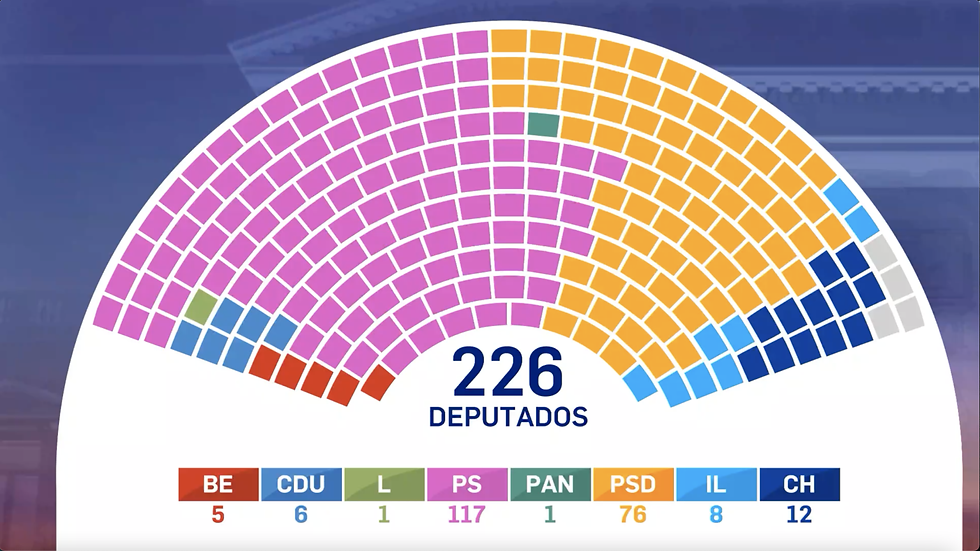PS wins comfortably, and that’s not all; here’s the new Portuguese Parliament
- Francisco Silva

- Feb 3, 2022
- 4 min read

This is the new parliament elected by Portuguese residents and citizens following the 2022 snap election that took place on the 30th of January. The polls leading up to the election tended to show a fierce battle between PSD and PS for the first place and talks for new coalitions seemed to be an inevitability. But as the electoral night passed by, not only PS managed to achieve a solid victory (being the choice of 41.7% of voters), but reinforced its presence in Parliament to the point where the party has elected 117 MPs at the time of writing (extra-territorial seats are yet to be awarded). In a parliament of 230 people, that number allows for an absolute majority of the centre-left party, making them the big winners of today’s elections. António Costa, secretary general of the Socialists, has promised to dialogue with all parties (but CHEGA) regardless, stating that an “absolute majority doesn’t imply absolute power.”
PSD (standing for Social Democratic Party)’s result was underwhelming to the party, with less than 28% of the vote and 71 seats in parliament. The leader of the party, Rui Rio, has recently been re-elected president of the party, but the internal stability did not translate into better results. The leader of the centre-right party has been trying to appeal to the centre, but that may have caused him to lose voters on the right, not managing to lure in enough voters from the centre to counter that loss. “If PS gets an absolute majority, I can’t see how I’ll be useful in this scenario,” said Rio – perhaps suggesting he could be stepping down as leader of the party. He added that “the party would decide.” In fact, he has not been as fierce in his opposition towards PSD as some right-wing parties would have wished; PSD voted alongside PS in around 60% of all laws presented, which some see as being “too much” and “too close” to the Socialists. The leader of the party CHEGA (“Enough!”) André Ventura has multiple times accused Rui Rio of “wanting to be the leader of the Socialist Party”.
CHEGA, unlike PSD, had a good electoral night. The far-right populist party has elected 12 MPs, effectively becoming the third most powerful party in the parliament with over 7% of the vote. In his speech, Ventura has threatened the leader of PS; “António Costa, I’m going after you now. If PSD does not do its job, from now on we will.”
Another successful party in these elections has been IL (Liberal Initiative), with 5% of the votes and 8 MPs elected. The party claims to not place itself within the dichotomy of left/right-wing politics and has gained a fair amount of support – especially among the younger people. The goal of the party was to elect five people in parliament, so this result beyond their expectations.
On the other hand, parties in the far-left have lost control of over half of the seats they got in 2019. Some have considered this a “punishment” by the people due to their contribution to failing the budget, while others (including members of these far-left parties) blamed it on the Socialist Party and its pressure on the people to ensure a “majority” for stability (something Costa has appealed for several times throughout the campaign) and effectively squishing BE and PCP’s representation in parliament.
The representative of Bloco de Esquerda (Left Bloc) Catarina Martins has called this a “difficult day” for the party, accusing Costa of “creating an artificial crisis” as a campaign strategy that seems to have been successful. Regarding CHEGA’s growth in these elections, Catarina Martins expressed concern; “Each racist MP in the parliament is one too many,” she said. Jerónimo de Sousa, leader of the Portuguese Communist Party (PCP), has made his stance clear, stating “PS now has the option to work with us, or to make compromises with the parties to their right (…) An absolute majority won’t silence our fight.” The representation in the parliament on the coalition PCP is in has halved from 12 to 6 MPs, with their allies “The Greens” (PEV) losing all their representation in parliament.
The centre to left-wing ecologist parties Livre (“Free”) and People, Animals and Nature (PAN) have kept one MP each in parliament, although the latter has lost four MPs in comparison to the 2019 layout of the parliament.
The centre-right Christian Democrats from People’s Party (CDS-PP) have lost all their representation in parliament for the first time since democracy was established in Portugal, even though more have voted for them (1,61%) than for PAN and Livre (1,53 and 1,28%, respectively). The leader of the party Francisco Rodrigues dos Santos has assumed responsibility for the defeat and promptly resigned from his position in parliament.
We are most likely looking at four more years with the Socialists in power, and for the first time in a while, with an absolute majority. This gives them more power, yes; but with power, comes responsibility, and an opposition that will be fierce with the intent to either influence the Socialists, or to bring them down.
Regardless of the results, there is one positive note to all; Portuguese participation in the elections has increased, with just 42% of abstention in the mainland in comparison to 45,5% back in 2019. This is the first time in two decades this happens, but it is uncertain whether this could be a trend, or a spike in participation due to uncertainty in the results.
Francisco Silva, 03/02/2022





Comments